Business news
Belarus president wants program on processing all timber

STARYYE DOROGI DISTRICT, 16 August (BelTA) – Belarus President Aleksandr Lukashenko has given instructions to work out a program on processing low-grade commercial timber. The head of state gave the relevant instructions as he visited an experimental forestry enterprise in Staryye Dorogi District on 16 August, BelTA has learned.
It is necessary to process all the timber resources. The program has to be implemented within the next three years. It will have to cover the wood, which cannot be used for purposes other than making wood chips and fuel pellets. It is profitable from the point of view of increasing the level of utilization of local fuel resources and from the point of view of export. The demand for fuel pellets is sufficiently high abroad.
“Only this year, the next one, and 2021! That’s all! We will see demand at the national level. You have to make plans in a way to get everything processed as of late 2022. It is the main goal. For the next five-year term we should make plans in a way to process everything, to leave no wind breakage. Forests are our greatest treasure. Everything must be processed. If you cannot round the logs and the rest, make pellets and sell them,” Aleksandr Lukashenko said.
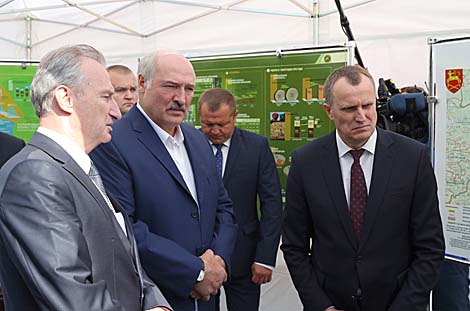 “We once talked about what needs to be done in forests, how wood should be processed to avoid rot. It is necessary to work out a precise program taking into account the available knowledge. Over the period of five years you will have to resolve all the forestry issues in a businesslike manner. The program has to be intensive,” Aleksandr Lukashenko said.
“We once talked about what needs to be done in forests, how wood should be processed to avoid rot. It is necessary to work out a precise program taking into account the available knowledge. Over the period of five years you will have to resolve all the forestry issues in a businesslike manner. The program has to be intensive,” Aleksandr Lukashenko said.
Belarusian Forestry Minister Vitaly Drozhzha informed those present that the area of forest lands grows larger despite some individual sites drying up due to timber beetle. “The situation is on the mend this year. The area with dried up forest has been halved,” the official noted.
The president drew attention to the need to properly use the wood cut down as a result of sanitary felling.
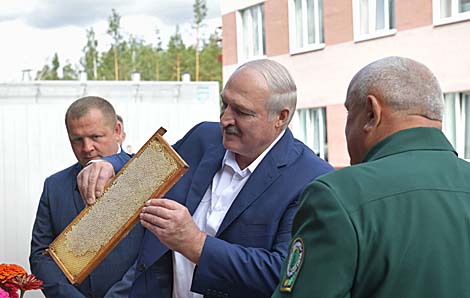 Work is in progress to build and upgrade zero-waste woodworking enterprises in various parts in Belarus in a bid to process more low-grade commercial timber. “A program to build six pellet plants is being implemented. The enterprises will resolve the problem of utilization of low-grade timber. All of them will be operational in H1 2020. We intend to get the first few pellets from some of them by the end of this year,” Vitaly Drozhzha said.
Work is in progress to build and upgrade zero-waste woodworking enterprises in various parts in Belarus in a bid to process more low-grade commercial timber. “A program to build six pellet plants is being implemented. The enterprises will resolve the problem of utilization of low-grade timber. All of them will be operational in H1 2020. We intend to get the first few pellets from some of them by the end of this year,” Vitaly Drozhzha said.
The official also said that the volume of production of fuel pellets will be at least doubled soon. “Virtually 100% of it is intended for export and has a high added value,” the forestry minister noted.
Aleksandr Lukashenko said: “The six pellet plants are the first stage. If we see they don’t make enough while the prospects are good and Europe can buy more, don’t take too long to launch the second stage. It is necessary to go on, make the equipment cheaper among other things.”
 Aleksandr Lukashenko was also made familiar with the work of the Staryye Dorogi experimental forestry enterprise. The president saw locally made products starting with birch tree juice, berries and mushrooms, honey and ending with fuel pellets and sawn timber. The forestry enterprise also grows tree saplings and ornamental plants for landscaping purposes. The president pointed out it was an important business venue particularly taking into account that 2020 will be the final year in the three-year-long Year of Native Land. “It is just what we need. Forests are sacred,” Aleksandr Lukashenko said.
Aleksandr Lukashenko was also made familiar with the work of the Staryye Dorogi experimental forestry enterprise. The president saw locally made products starting with birch tree juice, berries and mushrooms, honey and ending with fuel pellets and sawn timber. The forestry enterprise also grows tree saplings and ornamental plants for landscaping purposes. The president pointed out it was an important business venue particularly taking into account that 2020 will be the final year in the three-year-long Year of Native Land. “It is just what we need. Forests are sacred,” Aleksandr Lukashenko said.
The president sampled some of the locally made honey and received a box of local honey in honeycombs as a gift. Aleksandr Lukashenko noted he regularly eats honey: “Honey is always on my menu.”
Apart from that, Aleksandr Lukashenko visited a wood mill and was made familiar with the technology in use.
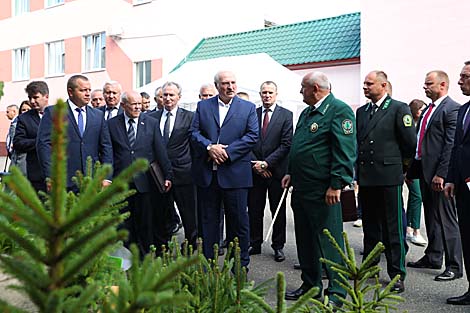 In accordance with the government program Belarusian Forest for the 2016-2020 period the most important metrics to evaluate the work of forestry industry enterprises include forest land percentage, timber harvesting per 1ha of forest lands, and energy saving. All the targets of the program are hit every year.
In accordance with the government program Belarusian Forest for the 2016-2020 period the most important metrics to evaluate the work of forestry industry enterprises include forest land percentage, timber harvesting per 1ha of forest lands, and energy saving. All the targets of the program are hit every year.
The country’s average forest land percentage stands at 39.8%. The average supply of growing stock amounted to 206.7m3 per 1ha. The share of new stock and genetically selected pedigree stock in the total area dedicated to forest restoration and forest cultivation is 52%. The volume of wood harvested per 1ha of forest land amounted to 3.28m3. The president’s instruction to build at least 100km of forest roads is fulfilled every year.
Positive dynamics of the country’s forest stock was secured in the last five years. The forest land area increased as well as the total supply of standing timber, including ripe timber and overmature timber. The main quantity and quality parameters of Belarusian forests have improved. An effective structure to manage the protection of forests from fires has also been created in Belarus. The quality of forestry industry management is indicated by the fact that nearly 100% of the forests are certified for compliance with the international forest certification system FSC and the European one PEFC. It is one of the top results in Europe.
As much as 28.6 million m3 of merchantable wood was harvested in Belarus in 2018.
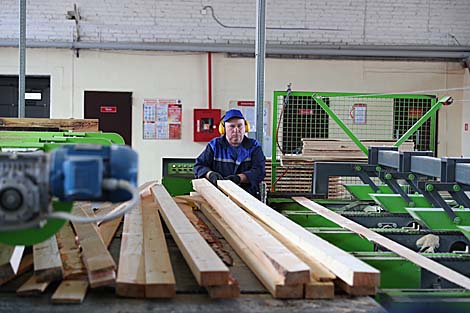 As for the economic side of the forestry industry, in 2019 proceeds from sales are expected to reach Br1.05 billion (194.7% as against 2015). Net profit is expected to reach at least Br40.9 million (378.5%) in 2019. The average salary of forestry industry workers is expected to be at least Br1,016 (181.1%) in 2019.
As for the economic side of the forestry industry, in 2019 proceeds from sales are expected to reach Br1.05 billion (194.7% as against 2015). Net profit is expected to reach at least Br40.9 million (378.5%) in 2019. The average salary of forestry industry workers is expected to be at least Br1,016 (181.1%) in 2019.
In 2018 enterprises run by the Forestry Ministry exported $140.6 million worth of timber products. While the share of round wood export was 51% in 2015, it dropped to zero in 2018. Belarusian forest products were exported to more than 25 countries in 2018.
Woodworking is an important component of the economy of the forestry industry. At present the Forestry Ministry system includes 88 woodworking enterprises. The volume of sales of products made by the woodworking industry rises every year.
Apart from that, there are hunting businesses in 74 forestry enterprises run by the Forestry Ministry. Proceeds from hunting are expected to reach Br5.5 million in 2019.
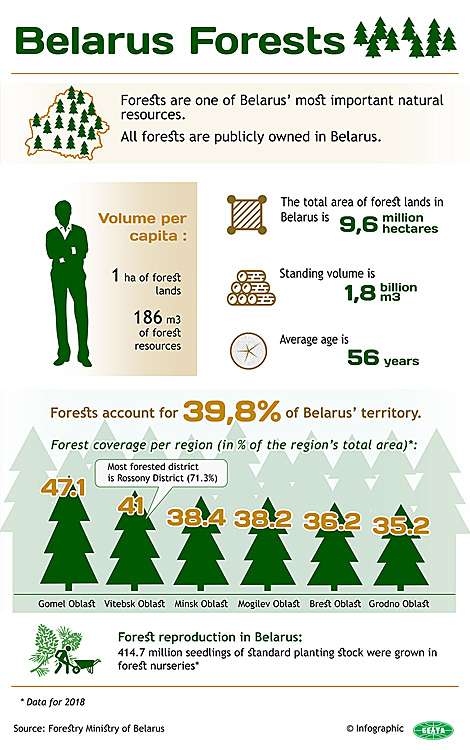







 print version
print version make home page
make home page add to bookmarks
add to bookmarks

